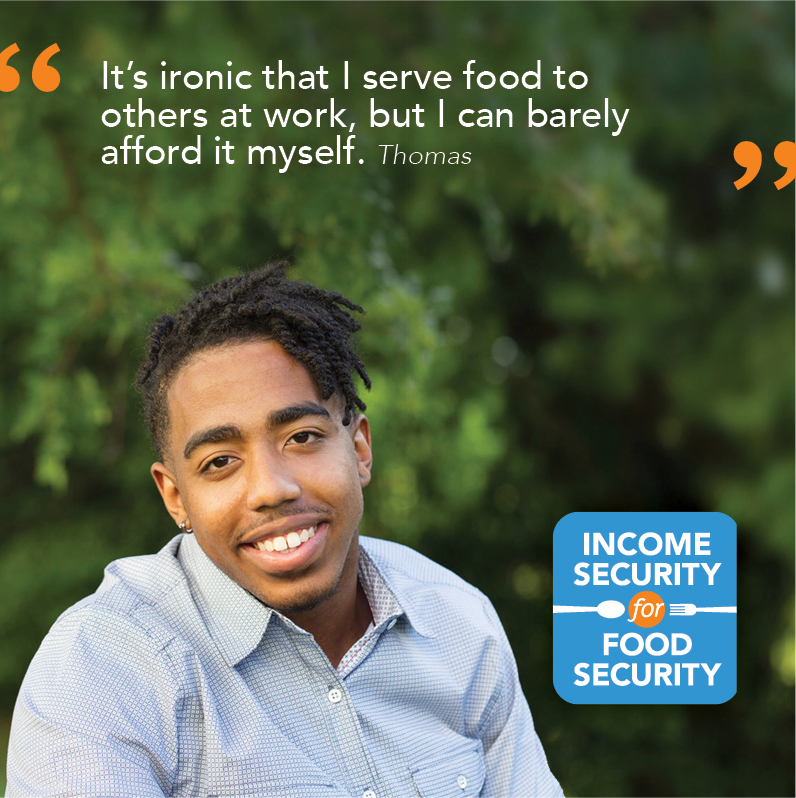Read the Stories
To read each story, click on either the name or the image below.
NOTE: The following are fictional stories about food insecurity that are based on real-life experiences shared by community members in Guelph and Wellington County. We are grateful for their contributions, which help to reflect the challenges of accessing and affording adequate, healthy food.
Thomas’ Story
NOTE: This fictional story about food insecurity is based on real-life experiences faced by residents of Guelph and Wellington County. The character of Thomas represents dozens of descriptions we have heard about the struggle of community members to access and afford adequate, healthy food.
Thomas supplements his career as an artist by working in a restaurant, a job he lost for more than a year during the pandemic shutdown. Even now that he’s back at work, the minimum wage he earns doesn’t leave much for food, and the restaurant no longer gives employees free meals like they did pre-pandemic.
“It’s ironic that I serve food to others at work, but I can barely afford it myself,” says Thomas. Before COVID, he took part in a meal-sharing group that organized free monthly potlucks and provided meal ingredients. This was a lifeline for Thomas, helping him make ends meet. “I could also tag along on free rides to the grocery store, which helped to cut back on transportation costs. But that all ended with COVID. The meal-sharing group disbanded and the free rides to the grocery store vanished.”
Thomas was left with no choice but to rely on transit or ride share, stretching his already tight budget. “I also find myself choosing pre-made meals that are pricey, but they save me time and don’t require me to buy a lot of separate ingredients. Or I pass up nutritious food for more affordable items that aren’t as healthy.”
As a pre-diabetic with clear-cut advice from his dietitian to follow a healthy lifestyle, Thomas’ decision to sacrifice fresh fruits and vegetables now might mean bigger costs to his health in the long run.
“I know I need to prioritize my health and nutrition, but it’s an uphill battle. And the pandemic may have ‘ended’, but healthier food is more expensive than ever before.” Thomas hopes for increased wages from his employer, so he can afford healthier food to prioritize his health.
Nadin’s Story
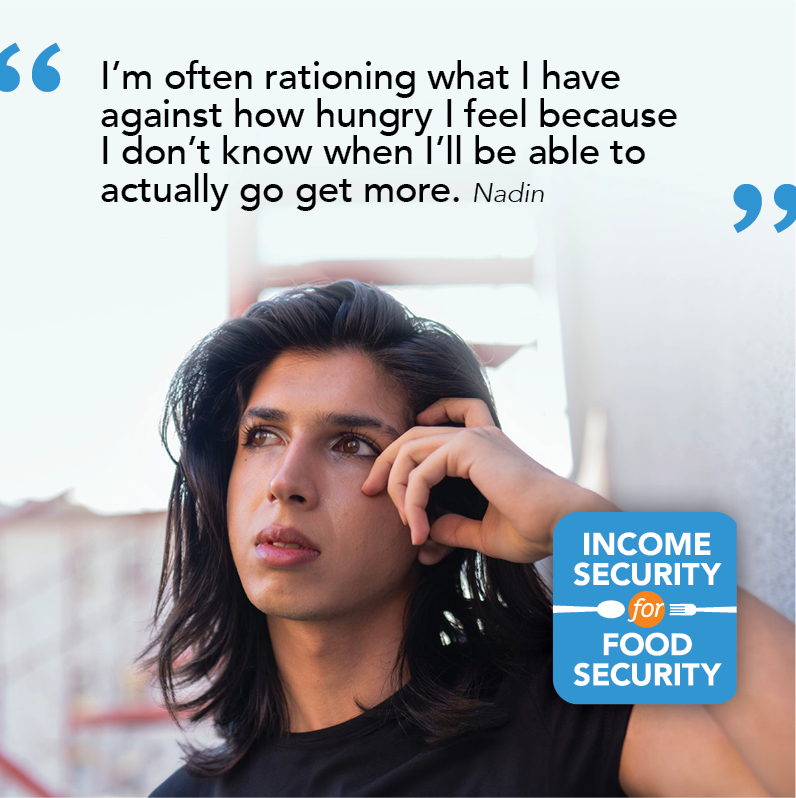
NOTE: This fictional story about food insecurity is based on real-life experiences faced by residents of Guelph and Wellington County. The character of Nadin represents dozens of descriptions we have heard about the struggle of community members to access and afford adequate, healthy food.
Nadin (they/them) moved to Guelph to pursue a degree in engineering. While the experience has been promising academically, they have been troubled by challenges around housing and food.
“In first year, I had access to the meal plan, but those savings are all used up and I don’t live in residence anymore,” says Nadin. They slept on a friend’s couch for a couple of months, unable to find housing due to low availability and very high rental rates. Finally, they were lucky to have secured off-campus accommodation that they share with roommates, although they still find themselves battling food costs.
“I have student loans and am working part time, juggling that along with my studies, and still making only enough to help cover rent and basic food. Friends sometimes go out to restaurants or pubs, but there’s no way I can do that, which makes me feel embarrassed.”
Sometimes the roommates shop together and share basic food items to keep costs down, and Nadin also visits the campus food bank, but lately even the food bank is struggling to meet demand. They go home to visit with family when they can for the chance to bring back leftovers or a few extra groceries, but they know their family is cash-strapped, too.
“Having enough to eat is stressful and weighs on my mind all the time. I’m often rationing what I have against how hungry I feel because I don’t know when I’ll be able to actually go get more.”
Nadin knows that they are not alone – other students face similar challenges, and even if others don’t have much, they are willing to share when they can. That’s why they are working hard to finish their degree, land a job and give back as ‘thanks’ for the help they have received from others.
Sarah’s Story
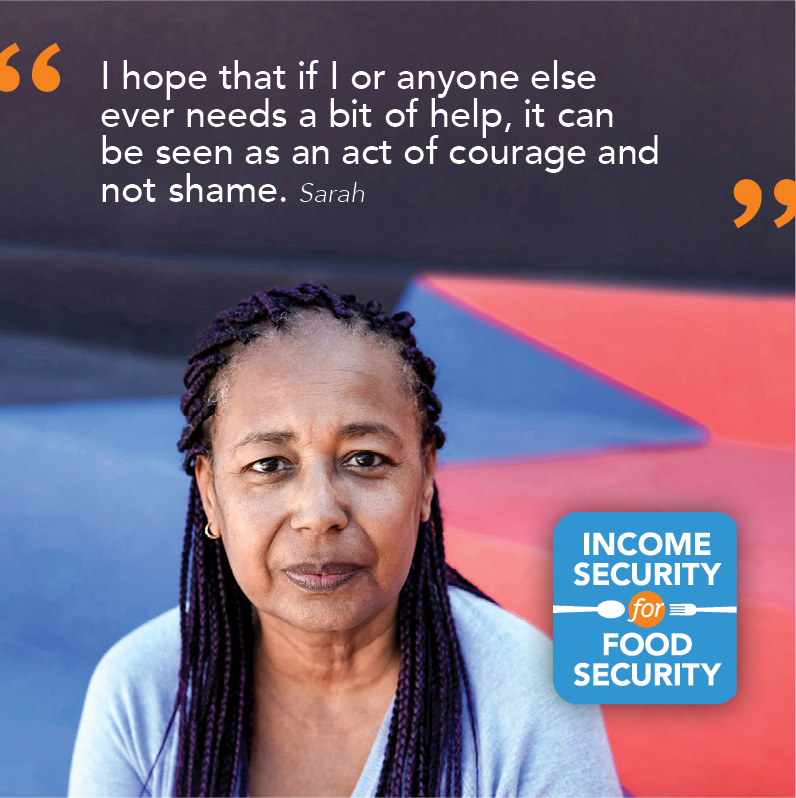
NOTE: This fictional story about food insecurity is based on real-life experiences faced by residents of Guelph and Wellington County. The character of Sarah represents dozens of descriptions we have heard about the struggle of community members to access and afford adequate, healthy food.
In the heart of a bustling and thriving city, Sarah faces the harsh realities of high rent and a static wage. The cost of living had soared, but her paycheque remains fixed at the same old figure.
“Rental rates have skyrocketed and it’s a battlefield out there,” says Sarah. “I scour every listing and every potential room, but so do 100 other people. It’s a tough competition for finding affordable living.”
As a result, Sarah lives in a small, rundown rental that still takes up most of her income. She finds herself struggling to put food on the table and frequently needs to reach out to local services to access adequate nourishing food. However, when she encounters judgement at these places it is in an often unexpected and disheartening way.
“I felt there was judgment by people when I go there,” Sarah says. “There’s hushed whispers outside, or disparaging glances. I even overheard one person say, ‘Why doesn’t she sell that coat? She doesn’t need to be shopping there.’ I paid $28 for the coat at a thrift store, and I love it. So that makes me feel even worse about needing help.”
She now avoids these organizations, opting instead for free dinners and marketplace swaps where she says that she finds more understanding and acceptance: “I hope soon, that there will be opportunity for me to secure a more affordable rental. But more than that, I hope that if I or anyone else ever needs a bit of help, it can be seen as an act of courage and not shame.”
Harold’s Story
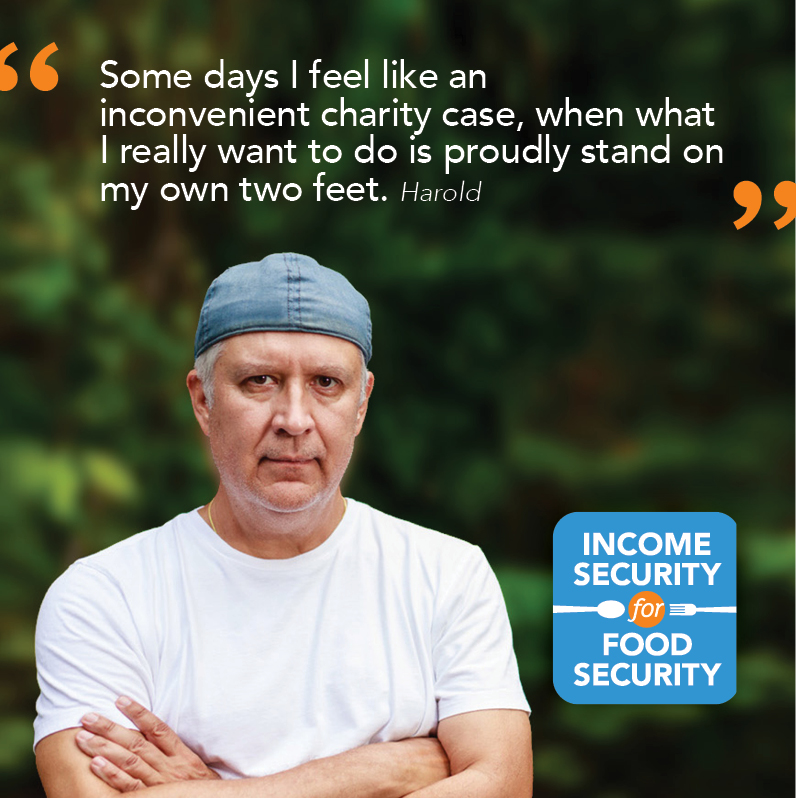
NOTE: This fictional story about food insecurity is based on real-life experiences faced by residents of Guelph and Wellington County. The character of Harold represents dozens of descriptions we have heard about the struggle of community members to access and afford adequate, healthy food.
A former worker at a manufacturing company, Harold’s world shifted when a workplace injury put him out of work at age 42. Denied access to Worker Safety and Insurance Benefits, Harold relied on Ontario Works until he was eventually approved for the Ontario Disability Support Program (ODSP). Living in a rural town with no pension or savings and only $1,228 per month from ODSP, Harold struggles to make ends meet.
“My ODSP payments aren’t enough. Sometimes I try to do small jobs for neighbours on days when I feel not too bad, but it’s really tough on my body,” says Harold. “Some of my money needs to go to health costs that aren’t covered by OHIP or Ontario Works. It doesn’t leave a lot and I’m still in pain most days. The food in my house right now is really just canned tuna and some bananas, and I mostly have just one meal a day. That’s what I’ve got to do to make sure I have enough to pay expenses.”
Harold considers himself one of the lucky ones as he receives a rental subsidy. “I don’t know if I’d even have a place to live if it wasn’t for that,” says Harold. Even with the rental subsidy, Harold is having a hard time putting food on the table. The cost of food at the nearest grocery store has risen more than 15% since the pandemic, which has made matters worse. “I rely on my neighbour for rides to the grocery store, so I can’t always take advantage of sales, but even if I can, it’s just so expensive on a tight budget like mine.”
As a result, Harold is left grappling with the stark difference between his day-to-day economic situation and the broader lifestyle he sees in his town. He says that the glances that often accompany his humble payments – counting out nickels and dimes – sting his pride. He has heard about community programs that might be able to help him with some food, but transportation is a barrier and he worries about facing judgement. Ultimately, like 75% of other food insecure households, he chooses not to access food from local charities, saying he prefers to leave that for families that he says need it more than he does.
“Some days I feel like an inconvenient charity case, when what I really want to do is proudly stand on my own two feet.”
Emily’s Story
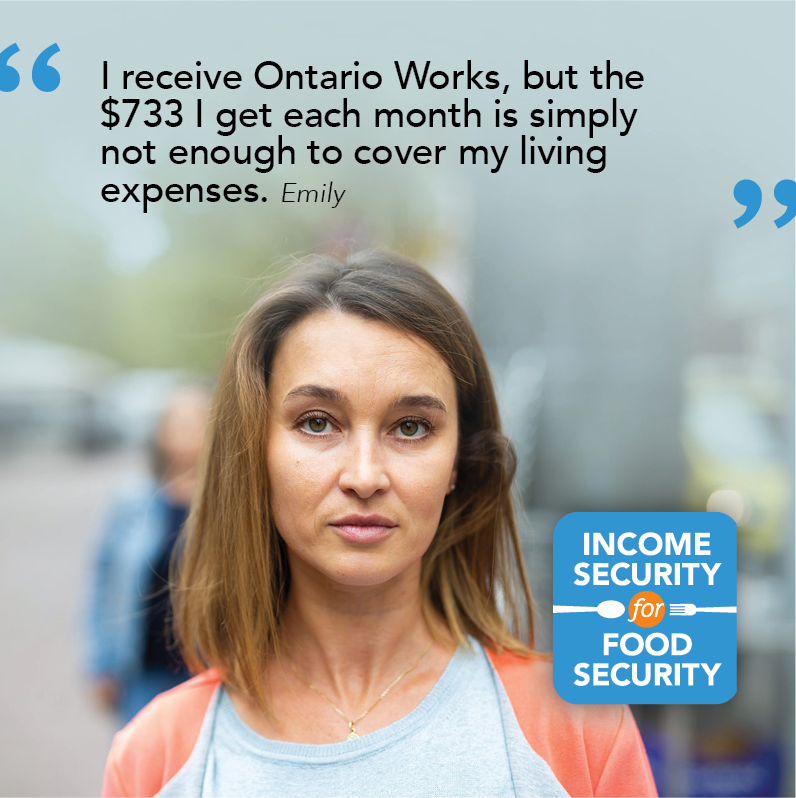
NOTE: This fictional story about food insecurity is based on real-life experiences faced by residents of Guelph and Wellington County. The character of Emily represents dozens of descriptions we have heard about the struggle of community members to access and afford adequate, healthy food.
Emily experienced significant abuse at home when she was young, resulting in her leaving home as a teenager and “couch surfing” or sleeping rough outdoors. Now in her mid-30s, she is on the road to recovery and is living in a home with others, but she suffers from PTSD and faces numerous challenges, including the inability to work a full-time job due to her disability.
“I have good days but a lot of pretty bad days, still,” says Emily. Counselling helps reduce the effects of her disability, but mental health supports in her community are difficult to access. She occasionally earns money by providing childcare for friends, but primarily relies on social assistance to meet her basic needs. Emily says that even working part time can be difficult. “I can only earn about $200 a month before the claw backs kick in.” After passing that income threshold, she’ll have to forfeit 50% of her earnings. “This makes it impossible for me to earn enough money to get by” Emily says.
“I receive Ontario Works, but the $733 I get each month is simply not enough to cover my living expenses,” says Emily. Emily has applied for ODSP (Ontario Disability Support Program) and has been denied twice. “I usually have to rely on what food supplies can be shared between my roommates and I, or meals that friends drop off sometimes, which gives me about half of what I need.”
As for the rest, she says getting access to healthy, affordable groceries is challenging. “I know that the variety store, which is just around the corner, charges higher prices when compared to grocery stores, and there isn’t as much healthy food. But with no money for transportation, it’s hard to get to a grocery store. That’s why I’m often buying a can of soup or some crackers at the convenience store.”
“Sometimes it feels like I’m barely surviving, and I know the stress about not having enough to eat isn’t good for my mental health. If I could get proper income support and access to other programs like mental health support, I could start to heal and thrive again.”
David’s Story
NOTE: This fictional story about food insecurity is based on real-life experiences faced by residents of Guelph and Wellington County. The character of David represents dozens of descriptions we have heard about the struggle of community members to access and afford adequate, healthy food.
David is a recent college graduate who is now employed full-time at a business with good prospects to grow into a leadership role with the company. Despite this, he is still having trouble making ends meet and financial stability remains uncertain.
“Sometimes, I only eat one meal a day so that I can still pay rent,” says David. Even though he is living with a roommate, he’s still short every month to cover essential costs like transportation to get to his job in another community, let alone adequate nutritious food.
“Having a full-time job is not enough. There’s a gap in income and expenses. It’s not realistic to survive on one “good” salary anymore,” says David.
David took the matter to his employer, hoping they might be able to help alleviate transportation costs to and from his job, which he cannot do remotely: “They showed no interest in increasing my pay, even slightly. It’s frustrating since I want to excel at my job, but it seems that my dedication wasn’t appreciated.”
Despite needing to work occasional overtime at work, David takes on other odd jobs doing landscaping for friends and family, and makes a little extra money as a ride-share driver. It helps him put food on the table but leaves him little personal time for himself. Many of his friends are facing similar financial stresses, he says.
“This is a problem for so many people that I’ve found a sense of unity with others in the community,” he says. “There are voices pushing for change like increased wages and fairness for me and others struggling to make ends meet. This is the change we need, but until it happens, I will continue to struggle.”
Ahman’s Story
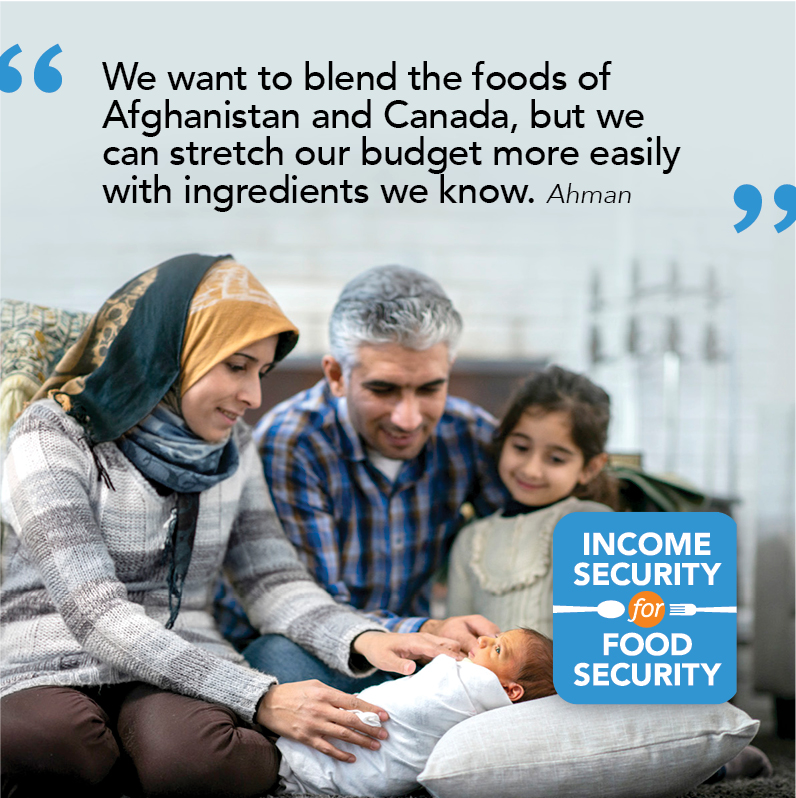
NOTE: This fictional story about food insecurity is based on real-life experiences faced by residents of Guelph and Wellington County. The characters of Ahmad and his family represent dozens of descriptions we have heard about the struggle of community members to access and afford adequate, healthy food.
Ahmad is happy that he and his family were approved to settle in Canada after fleeing their home in Afghanistan, but the move has resulted in several unique challenges, including being able to afford (or sometimes even find) traditional Afghan ingredients.
“It’s hard to come to a new country with a different culture and a lack of familiar foods,” says Ahmad, whose new home in a small Wellington County community is far from the cultural centers of urban Canada.
“Everything is very expensive, so we must be really careful with what we choose. We want to embrace our new home and blend the foods of Afghanistan and Canada, but we can stretch our budget more easily with ingredients we know. There’s a lot of homesickness too, which is made harder by not being able to find or afford familiar foods.”
In the early days of their arrival, no one in Ahmad’s family had a car or driver’s license which made things more challenging. Even if they could get a ride, no local stores had traditional Afghan ingredients. Even now, with access to a vehicle, Ahmad still often finds himself journeying to larger, neighbouring cities like Guelph that are more ethnically diverse. In these places, he is more likely to find the ingredients and flavours that his family associate and connect with their Afghan roots. Shopping in multiple stores, and the cost of gas, makes food even more expensive on his family’s limited income.
While he looks for a higher paying job to make ends meet, Ahmad hopes there may soon be increased opportunity to find affordable and diverse fresh food in his community, supporting a sense of belonging in a new land so far from Afghanistan.
Laura’s Story
NOTE: This fictional story about food insecurity is based on real-life experiences faced by residents of Guelph and Wellington County. The characters of Laura and her family represent dozens of descriptions we have heard about the struggle of community members to access and afford adequate, healthy food.
Laura lives in a small apartment in Guelph with her children Emily and Alex. For years now, Laura, a single mother, has faced a continued struggle to keep her children fed and nourished.
“I feed my kids first to ensure they have enough to eat,” says Laura, an effort which has sadly resulted in her cutting back on her own meals. Over a two-month period, she lost almost 20 pounds.
Regardless, the welfare of her children remains her primary concern. She is a frequent visitor to local food support programs. They are a lifeline, says Laura, but they can only provide so much: “I often have to take the bus to visit several places, sometimes up to six, to gather enough food. It’s challenging and dehumanizing.” The need to navigate multiple food support programs leaves her feeling worn out and affects her mental health.
Laura’s paycheques from a retail store, where she earns minimum wage, never seem to stretch far enough for rent, bills and groceries, let alone what might be considered “luxuries” by some. “Emily couldn’t go to a friend’s birthday party because I couldn’t buy a present. Alex chooses to not go to the skate park with his friends because I can’t buy him the skateboard he’s been wanting or even give him change to get a snack while he’s there. It’s embarrassing for them and me, and there’s anger sometimes. It’s a difficult conversation to have with kids when I tell them no.”
Laura says that while the community is generous and there are many helpful local food support services, what she needs most is a job that pays more than minimum wage.
Learn more about how we can support community members through Income Security for Food Insecurity.

